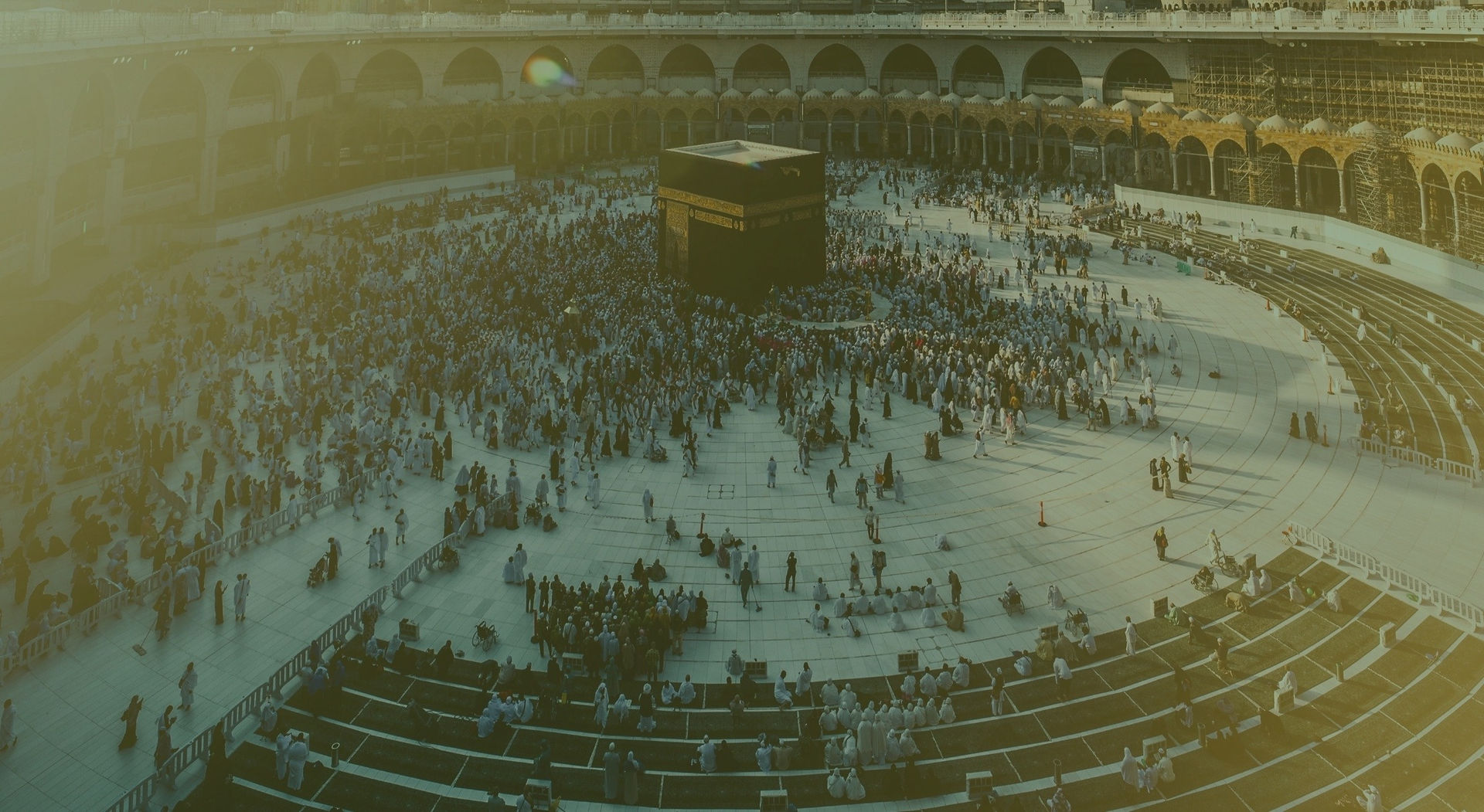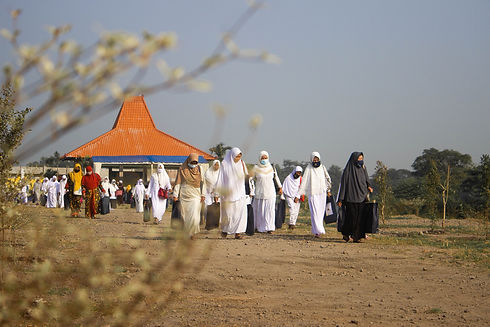
Islam
"This day I have perfected for you your religion and completed My favour upon you and have approved for you Islam as religion."
The Qur'an, chapter 5, verse 3.
...a brief introduction
When Muhammad ﷺ (peace be upon him) first received revelation from Allah (God) through the Angel Gabriel in about 570 CE, he became the final prophet; the culmination of a line stretching back to the first human being, Adam, which included Noah, Abraham, Moses, David and Jesus, to name just a few. Thus began the final revelation to humanity, ending almost 23 years later with the verse cited above.
Together with account of Prophet Muhammad’s ﷺ sayings and actions (known as the Sunnah), they define Islam, the religion and complete way of life that God has decreed for humanity for the rest of time.
This revelation, the Qur’an, is in the tradition of earlier books revealed by God:
-
to Moses – the Torah
-
to David – the Psalms
-
to Jesus – the Gospel.
Whilst the original texts of earlier revelations have been lost, the Qur’an remains pristine; the Word of God, which He has promised to preserve unchanged until the end of time
It means submission to the Will of God. The root of the word also means peace. A person who follows Islam is known as a Muslim – one who submits.
There are five essential ‘pillars’ in Islam:
-
Shahadah: bearing witness that there is no God but Allah, and that Muhammad is His messenger.
-
Salah: performing the compulsory prayers.
-
Zakah: paying a portion of wealth for the poor and needy.
-
Sawm: fasting in the month of Ramadan.
-
Hajj: undertaking the Pilgrimage to Makkah at the set time (if one has the means).
The first pillar is recognition that God alone is worthy of worship, that He is One, that He has no partner nor associate, that He was not born nor will He die, that Sovereignty belongs only to Him, and that the way to worship Him is by following the example of Prophet Muhammad ﷺ. We begin to understand God – Whose proper name is Allah – through His names and attributes, such as The Merciful, The Kind, The Lord, The Sustainer.
The other pillars of Islam are explained in separate sections:
-
Prayer in Islam
-
Zakah & Charity
-
Fasting & Ramadan
-
Hajj & Umrah
Prayer in Islam

“Recite, what has been revealed to you of the Book and establish prayer. Indeed, prayer prohibits immorality and wrongdoing, and the remembrance of Allah is greater. And Allah knows that which you do.”
The Qur'an, chapter 29, verse 45
Salah, the second pillar of Islam, is a form of prayer which must be performed in a prescribed manner, and at particular times. It takes the form of standing, bowing, prostrating and sitting in a given sequence, whilst reciting the words of the prayer in Arabic. Muslims must normally prayer at five specific times each day, preceded by a ritual washing known as Wudu.
People can prayer wherever is convenient, so long as it is clean. This can be at home, or where you work. For men, it is preferred they make the effort to pray in congregation at their local mosque. This is why most mosques are open for the five daily prayers.
The midday prayer on Friday is special, and follows a sermon given by the Imam. It is compulsory for men to attend, but optional for women.
There are special prayers at other times, like on each of the two Eid mornings, when the whole family is encouraged to go to prayer.
Prayers more familiar to other religions are the supplications a Muslim makes to God – known as Dua. These can be your own words, or some of the beautiful supplications mentioned in the Qur'an or made by Prophet Muhammad (Peace be upon him).
There are so many benefits in performing regular prayers.
Prophet Muhammad (Peace be upon him) said,
“If there was a river at your door and you took a bath in it five times a day, would you notice any dirt on you?” They said, “Not a trace of dirt would be left.” The Prophet said, “That is the parable of the five prayers by which Allah removes sins.”
Zakah & Charity
At the core of Islam is the duty to look after the poor and needy. Zakah is a compulsory act or worship, the giving of a portion of one's wealth to those in the greatest need. It can only be spent on those mentioned in the above verse of the Qur'an; it cannot, for example, be used for other virtuous causes, such as building mosques.
The paying of Zakah is not seen as a burden, rather a blessing because it means Allah has been generous in giving us enough wealth; people below a certain level of wealth do not pay Zakah.
Central Masjid can collect and distribute Zakah.
Zakah is not charity; charity (also known as Sadaqah in Islam) is the voluntary giving of one's wealth, but this so greatly recommended in Islam, and so highly rewarded, that Muslims have a very strong sense of the need to give charity. Central Masjid collects charity to help deliver its services.
“The alms [Zakah] are only for the poor and the needy, and those who collect them, and those whose hearts are to be reconciled, and to free the captives and the debtors, and for the cause of Allah, and (for) the wayfarer; a duty imposed by Allah. Allah is Knower, Wise.”
The Qur'an, chapter 9, verse 60

Fasting & Ramadan

“O you who believe! Fasting is prescribed for you, even as it was prescribed for those before you, that you may become righteous. (Fast) a certain number of days; and (for) him who is sick among you, or on a journey, (the same) number of other days; and for those who can afford it there is a ransom: the feeding of a poor person – but whoever does good of his own accord, it is better for him: and that you fast is better for you if you did but know.
The month of Ramadan in which was revealed the Qur’an, a guidance for mankind, and clear proofs of the guidance, and the criterion between right and wrong). And whosoever of you is present, let him fast the month, and whosoever of you is sick or on a journey, (let him fast the same) number of other days. Allah intends for you ease, He intends not hardship for you; and (wants) that you should complete the period, and to glorify Allah for having guided you, and that perhaps you may be grateful.”
The Qur’an, chapter 2, verses 183–185
Fasting is a virtuous act of worship, compulsory (with some exceptions) during the month of Ramadan, and optional at other times. Muslims fast by abstaining from food, drink and sexual relations from dawn to sunset.
There are many benefits to fasting, as it also requires us to make the effort to give up bad habits, such as harsh speech, and to think about the food we eat. It is a time to become more conscious of our Creator, and to try and become a better person.
In Ramadan, our sense of community increases, as does our attention to worship. Here at the East London Mosque, congregations increase during this month. Every day over 500 people come to the mosque to break fast together.
There is more to the month of Ramadan than fasting. There a special, optional prayers in the evening after the last of the compulsory prayers, known as Tarawih. In our mosque they last about two hours, and are led by Imams who recite the Qur’an very beautifully. Yet even though they are not compulsory, and come at the end of a long day of fasting, still thousands attend our mosque, and other mosques, every single night.
One of the last ten nights is known as the Night of Decree (or Night of Power):
“Indeed, We sent the Qur’an down during the Night of Decree.
And what can make you know what is the Night of Decree?
The Night of Decree is better than a thousand months.
Therein descend the angels and the Spirit (Gabriel) by permission of their Lord for every matter.
Peace it is until the appearance of dawn.”
The Qur’an, chapter 97
The exact night is not known, but from the sayings of Prophet Muhammad (peace be upon him) we know it is on one of the odd-numbered nights.
The beginning and end of the month of Ramadan depend on the sighting of the new Moon. The first day after Ramadan is one of the two days of Eid, namely Eid al-Fitr – a day of celebration and gratitude to Allah, which begins with special Eid prayers in the morning that the whole family attends.
Hajj & Umrah
“And proclaim to mankind the Hajj (pilgrimage). They will come to you on foot and on every lean camel, they will come from every deep and distant (wide) mountain highway”
The Qur'an, chapter 22, verse 27

Hajj, the fifth of the pillars of Islam, is compulsory for those able to undertake this pilgrimage to Makkah. It is at a set time each year, in the Islamic month of Hajj, and brings together about 3 million Muslims to this holy sanctuary.
The rites of Hajj, which we learn from the pilgrimage of Prophet Muhammad (peace be upon him), commemorate some of the actions of Prophet Ibrahim (Abraham) and his family (peace be upon them).
On the first day of Hajj, the pilgrims assemble in Mina (just outside Makkah), staying in tents or in the open. The next day they all go to the plain of Arafat, where they listen to the Hajj sermon and pray together. That night, they sleep in the open in nearby Muzdalifah, before returning to Mina in the morning.
The third day of Hajj is the busiest for pilgrims: they throw small pebbles at columns of stone, symbolising the rejection of Satan and all evil; they arrange for the sacrifice of an animal, recalling Ibrahim's submission to the Will of God when he was commanded to sacrifice his son, Ismail, only for him to be reprieved at the last minute; they go to Makkah to circle the Ka'bah and walk between Safa and Marwa; and they shave or cut their hair.
After this, men can change out of the two white sheets they have been wearing into their normal clothes, then all the pilgrims stay in Mina for up to three further days.
Hajj is a unique experience. Just as the five daily prayers give a spiritual boost each day, and fasting in Ramadan gives an extra spiritual boost each year, so the Hajj can be such a profound once-in-a-lifetime spiritual experience that for the most sincere who perform it correctly, it changes them to be a better person, less absorbed in their own material needs, and more considerate of the needs of others and of the life-hereafter. It brings together before God, standing equally side by side, people from every part of the world, from every walk of life.
Pilgrimage outside the season of Hajj is called Umrah, and is only to the Ka'bah in Makkah, without many of the rites of Hajj.
Many pilgrims make the journey from the Ka'bah in Makkah (the holiest place in Islam) to visit the mosque of Prophet Muhammad in Madinah (the second most holy place in Islam).
Jumu’ah

The Prophet (peace and blessings of Allaah be upon him) said:
“Whoever misses three Jumu’ahs out of neglect, Allaah will place a seal upon his heart.”
Narrated by Abu Dawood, 1052; al-Nasaa’i, 1369; Ibn aajah, 1126;
Jumu'ah (Arabic: صلاة الجمعة, ṣalāt al-jumu‘ah), also known as Friday Prayer or Congregational Prayer, is a prayer (ṣalāt) that Muslims hold every Friday, just after noon instead of the Zuhr prayer.
Jumu’ah prayer is one of the symbols of Islam and is one of the major obligations. There are stern warnings against abandoning it, as
the Prophet (peace and blessings of Allaah be upon him) said:
“Whoever misses three Jumu’ahs out of neglect, Allaah will place a seal upon his heart.”
Narrated by Abu Dawood, 1052; al-Nasaa’i, 1369; Ibn Maajah, 1126; classed as saheeh by al-Albaani in Saheeh Abi Dawood.
It was narrated that Abu Lubaabah ibn ‘Abd al-Mundhir said:
The Prophet (peace and blessings of Allaah be upon him) said: “Friday is the master of days, and the greatest of them before Allaah. It is greater before Allaah than the day of al-Adha and the day of al-Fitr. It has five characteristics: on this day Allaah created Adam, on it He sent Adam down to the earth, on it Allaah caused Adam to die, on it, there is a time when a person does not ask Allaah for anything but He gives it to him, so long as he does not ask for anything haraam, and on it the Hour will begin. There is no angel who is close to Allaah, no heaven, no earth, no wind, no mountain and no sea that does not fear Friday.”
On Friday's, the Jumu'ah Prayer is held from 1:00 p.m. to 2:00 p.m. Lunch is usually on sale.
